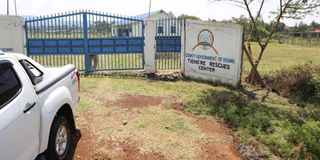State now lists SGBV shelters as essential service

Tieng’re Rescue Centre in Kisumu, a safe house constructed for SGBV survivors in the county.
What you need to know:
- The government has listed provision of shelters and safe houses for survivors of sexual and gender based violence (SGBV) an essential service.
- Gender equality advocates have lauded the government for heeding their pleas to recognise the crucial needs of women and girls at this vulnerable period.
- Last year, in the period during which schools were closed, curfews and inter-county movements were restricted, the rates of SGBV rose by 92.2 per cent.
The government has listed provision of shelters and safe houses for survivors of sexual and gender based violence (SGBV) an essential service, a major milestone in protection of women and girls rights’ in the ongoing Covid-19 pandemic.
Children protection service providers also fall in the same category in the April 12, gazette notice by Cabinet Secretary for Interior and Co-ordination of National Government Dr Fred Matiang’i.
Gender equality advocates have lauded the government for heeding their pleas to recognise the crucial needs of women and girls at this vulnerable period when SGBV cases are bound to increase.
Last year, in the period during which schools were closed, curfews and inter-county movements were restricted, the rates of SGBV rose by 92.2 per cent.
At the time, a group of women’s rights organisations petitioned the government to prioritise provision of safe houses and shelters.
These were Centre for Rights Education and Awareness (Creaw), Federation of Women Lawyers-Kenya (Fida-Kenya) and Coalition on Violence against Women-Kenya, Covaw (K). They also included Equality Now, Groots Kenya, Sustainable Development Goals Forum Kenya (SDGs Forum) and Kenya Female Advisory Organisation (Kefeado).
Funding shelter
They further proposed the use of at least 30 per cent share of Covid-19 funds to providing SGBV services, including funding shelter and safe houses, support SGBV survivors’ access medico-legal services and psychosocial support.
At the same time, they appealed for integrated anti-SGBV messaging during the daily briefing on the status of Covid-19 in the country.
“This is a big move,” said Creaw executive director Ms Wangechi Wachira
By prioritising provision of shelters and safe houses alongside children protection officers, the government has eased evacuation of SGBV survivors from unsafe spaces, she said.
For instance, children officers can accompany the rescued girls to the shelters without fear of being arrested for violating the curfew order.
“In Nairobi alone, in the first week of the latest lockdown, the number of women who sought for shelters went high,” she said.
“They don’t have alternative escape channels as they cannot return to their homes in the villages. The shelters therefore, remain the only option and that is why we must keep them open and running to secure the survivors of SGBV.”
Kenya, however, has a huge shortage of shelters with only one government-run (in Makueni County) and at least 40 others privately-owned, distributed in 15 counties.
Gender specialist Ms Florence Machio, said the Covid-19 pandemic illustrates the urgency of the government to invest in shelters and safe houses.
“There is no better time than now for the government to ensure we have safe houses in every county,” she said.
Clear directive
“We want State-run shelters. Why? Because our taxes are always there. And so, they will always run.”
Late last year, the Ministry of Public Service and Gender released guidelines on establishing the safe houses and the shelters.
The Safe Spaces Models and Applicability Manual requires that safe and protective spaces “should be located near amenities such as community centres, markets, schools, police stations and health facilities.”
They should also be in physically safe and easily accessible spaces at all hours.
The gender specialist, however, raised concerns over lack of clear directive to the police on facilitating mobility of SGBV survivors and expectant mothers in the curfew hours.
This, she said, could eliminate risks of expectant mothers dying due to preventable labour related complications
“Maternal deaths in this country are pushed by obstructed labour and delays. So it is important that the police have a clear directive so that they don’t delay a mother in labour,” she said.
The latest move by the government is the third major gender responsive measure taken in the fight against Covid-19. For two weeks, the Ministry of Health, relayed gender neutral data on the affected individuals. This changed following global and local calls to have information broken down by sex to inform anti-Covid-19 responses.
This was followed with integration of anti-SGBV messaging in the daily briefing, although this was short-lived.





